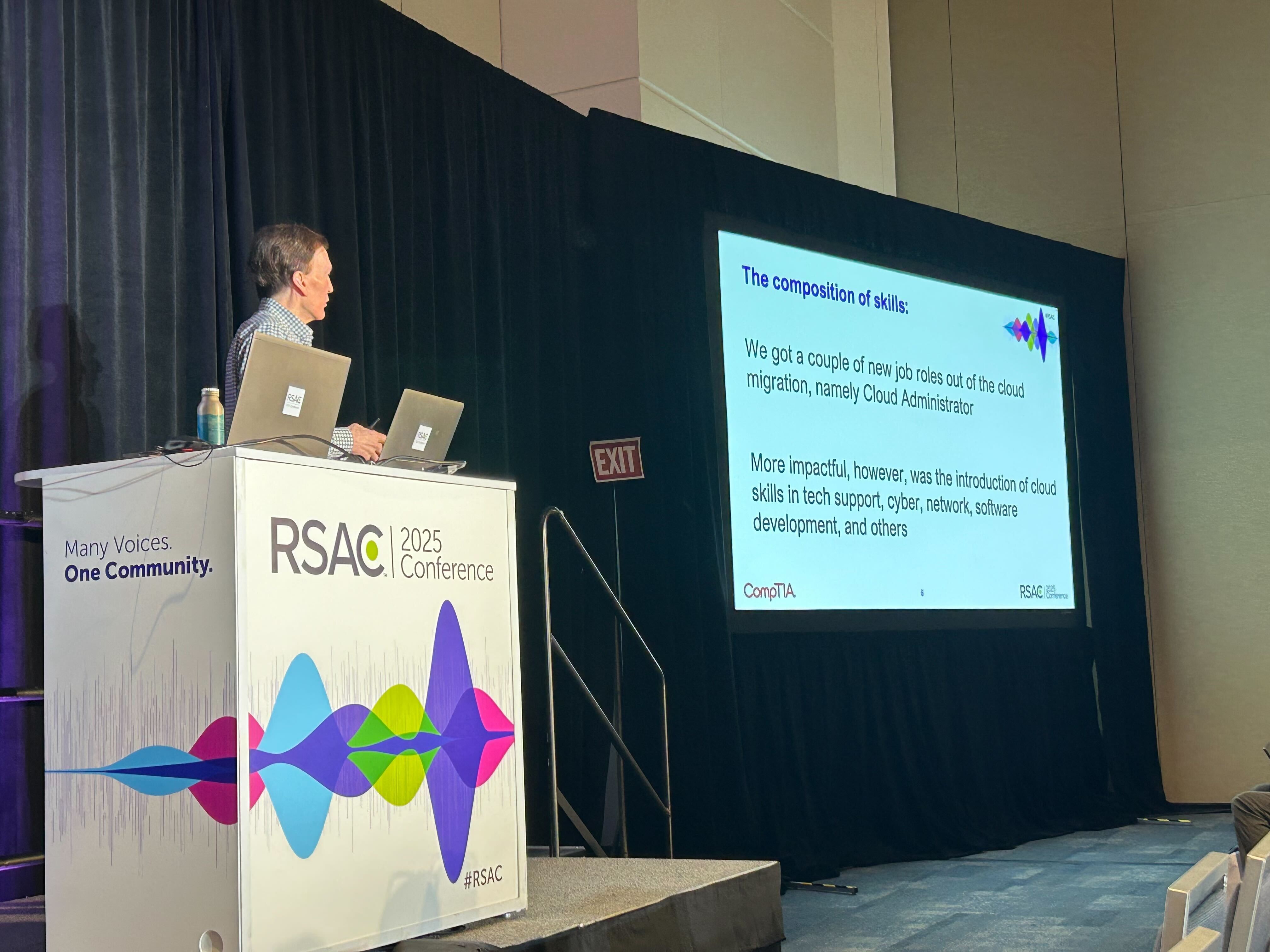 The cybersecurity industry is evolving rapidly, driven by the integration of artificial intelligence (AI) into every facet of the IT world. At RSAC 2025, Todd Thibodeaux, CEO of CompTIA, shared insights into how AI is reshaping cybersecurity certifications, training, and job roles. This blog explores the key takeaways from his session and provides a roadmap for professionals looking to thrive in the AI-driven cybersecurity landscape.
The cybersecurity industry is evolving rapidly, driven by the integration of artificial intelligence (AI) into every facet of the IT world. At RSAC 2025, Todd Thibodeaux, CEO of CompTIA, shared insights into how AI is reshaping cybersecurity certifications, training, and job roles. This blog explores the key takeaways from his session and provides a roadmap for professionals looking to thrive in the AI-driven cybersecurity landscape.
What is AI in cybersecurity?
Artificial intelligence in cybersecurity refers to the use of AI technologies to enhance threat detection, automate routine tasks, and improve overall security measures. As AI becomes more prevalent, cybersecurity professionals must adapt to new tools and methodologies to stay ahead of emerging threats.
The composition of skills: A new era of competency
AI is fundamentally changing the skills required for cybersecurity professionals. Employers are no longer just looking for technical knowledge—they want candidates who can demonstrate practical competency in using AI tools effectively.
Key skills for the future cybersecurity workforce include:
- Scenario-based problem-solving: Professionals must navigate unpredictable, AI-driven scenarios.
- Efficiency and adaptability: Quickly discerning good answers from bad ones and automating routine tasks will be critical.
- Understanding AI’s dual nature: Cybersecurity experts must grasp how AI can be used for both defense and malicious purposes.
These skills are becoming essential as more employers adopt smarter pre-employment assessment tools to evaluate candidates.
AI’s impact on training: A new framework for learning
Training for cybersecurity roles has always been dynamic, but AI is revolutionizing the way individuals prepare for the field. From adaptive systems to AI-driven cyber ranges, training is becoming more immersive and competency-focused.
Here’s how AI is reshaping cybersecurity training:
- AI-driven cyber ranges: These environments simulate real-world challenges with unpredictable, AI-generated scenarios.
- AI-powered learning partners: AI agents with access to infinite knowledge will serve as teammates in team-based learning exercises.
- AI instructors and tutors: With a shortage of human instructors, AI-powered tutors are stepping in to provide personalized training.
- Competency over memorization: Training is shifting from rote learning to hands-on, skills-based approaches to ensure professionals are job-ready.
Cybersecurity certifications: Reinventing standards for the AI era
The cybersecurity certification landscape is vast, with CompTIA Security+ being one of the most widely recognized credentials. However, as AI transforms the industry, certifications must evolve to remain relevant.
CompTIA is leading the charge with SecAI+, a stand-alone certification designed to complement Security+, PenTest+, CySA+, and other credentials.
To keep pace with AI advancements, certifications need to:
- Incorporate scenario-based testing: Exams should simulate real-world challenges to better assess candidates’ skills.
- Adopt open-book, multi-session formats: This mirrors how professionals work in real life, emphasizing problem-solving over memorization.
- Focus on tasks and competencies: Certifications should prioritize practical skills over theoretical knowledge.
- Introduce unpredictability: Testing environments must become more dynamic and chaotic to truly test candidates’ abilities.
AI and job roles: Shaping the workforce of the future
AI is not just creating new job roles—it’s redefining the skills required across existing ones. While CompTIA envisions two distinct AI-focused roles—AI Architect and AI SysOp—the impact of AI extends far beyond these positions.
In cybersecurity, the demand for AI skills is skyrocketing. More than half of job postings for entry-level cybersecurity roles now reference AI competencies.
Critical skills for these roles include:
- Using large language models (LLMs): Professionals must quickly find accurate answers using tools like ChatGPT.
- Evaluating AI outputs: The ability to discern good from bad answers is essential.
- Automating tasks: Routine processes can be streamlined with AI, freeing up time for more strategic work.
- Understanding AI threats: Cybersecurity experts must anticipate and mitigate malicious uses of AI.
Preparing for the AI-driven future
AI is not just a tool—it’s a transformative force reshaping the cybersecurity workforce. As we look to the future, it’s clear that professionals must embrace AI to stay competitive. From training and certifications to job roles and skills, the industry must adapt to this new reality.
CompTIA is committed to preparing the next generation of cybersecurity professionals through innovative certifications like SecAI+ and a focus on competency-based training. The future is here, and it’s time to embrace the opportunities AI presents.
Stay ahead in cybersecurity
Are you ready to future-proof your cybersecurity career? Explore CompTIA’s certifications, including Security+, PenTest+, CySA+, and the upcoming SecAI+, to gain the skills and credentials you need to thrive in an AI-driven world. Visit CompTIA.org to learn more and take the next step in your cybersecurity journey.

